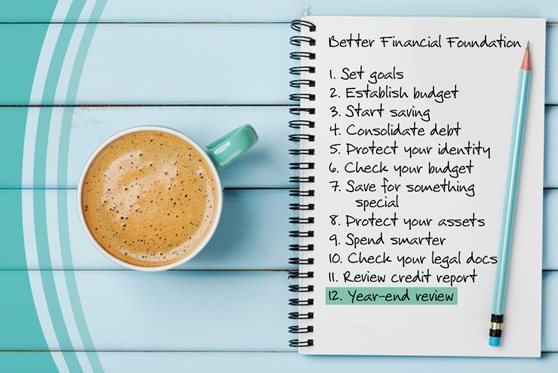As the year draws to a close, now is a good time to review your finances from the past year and make plans for the year ahead.

Clean up your financial papers and digital records.
Collect paperwork and digital files that you’ll need for your taxes. These include receipts for charitable donations, childcare, medical expenses, real estate and vehicle taxes, tax preparation fees from last year, and miscellaneous income.
According to the IRS website, most people need to retain tax records for three years. Here are the guidelines:
-
Keep records for 3 years if situations (4), (5), and (6) below do not apply to you.
-
Keep records for 3 years from the date you filed your original return or 2 years from the date you paid the tax, whichever is later, if you file a claim for credit or refund after you file your return.
-
Keep records for 7 years if you file a claim for a loss from worthless securities or bad debt deduction.
-
Keep records for 6 years if you do not report income that you should report, and it is more than 25% of the gross income shown on your return.
-
Keep records indefinitely if you do not file a return.
-
Keep records indefinitely if you file a fraudulent return.
-
Keep employment tax records for at least 4 years after the date that the tax becomes due or is paid, whichever is later.
Learn more on the IRS website.
Out with the old, in with the new: Get rid of old files.
Make room in your file cabinet—physical or virtual—by getting rid of old files. Paper files should be shredded or taken to a secure disposal site. Getting rid of digital files means deleting them and then emptying the Trash/Recycle Bin on your computer, tablet, and/or phone. When disposing of old electronics, be sure to remove all personal files and data by performing a factory reset. This article from AARP includes instructions for how to perform a factory reset on popular devices.
Review your financial situation and set goals for the year ahead.
Revisit the goals you set for yourself at the beginning of the year. Did you try to save more? Pay off some debts? Clean up your credit report? Whatever it was, take some time to assess if you met your goals for the year and what goals you want to set for 2024. Visit any of our “Better Financial Foundation” steps that you missed this year:
-
Set goals
-
Establish budget
-
Start saving
-
Consolidate debt
-
Protect your identity
-
Check your budget
-
Save for something special
-
Protect your assets
-
Spend smarter
-
Check your legal docs
-
Review credit report
If you’re having trouble reaching your financial goals, contact your local branch. We can help you review ways to save money and reach your financial goals.